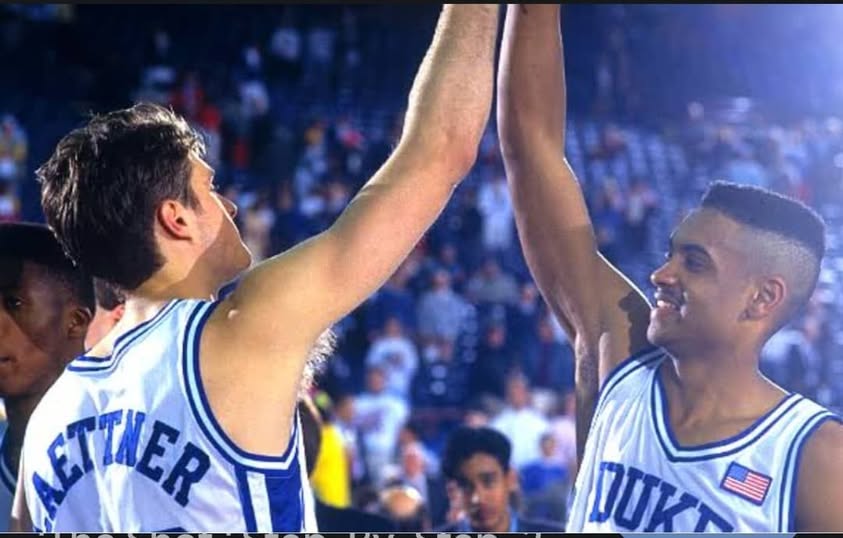**Legacy Showdown: Christian Laettner vs. Grant Hill – Who Truly Built Duke’s Basketball Empire**
The Duke Blue Devils are synonymous with excellence in college basketball, a program built on the backs of legendary players who elevated the team to national prominence. Among the pantheon of Duke greats, two names stand above the rest: Christian Laettner and Grant Hill. Both were central figures in Duke’s back-to-back national championships in 1991 and 1992, and both went on to have notable NBA careers. Yet, their legacies at Duke are often debated—who was more instrumental in building the Blue Devils’ empire? Was it Laettner, the fierce, clutch-scoring big man whose competitive fire defined an era? Or was it Hill, the smooth, versatile forward whose all-around brilliance set the standard for modern Duke players? To answer this, we must examine their contributions on the court, their roles in Duke’s biggest moments, and the lasting impact they left on the program.
Christian Laettner is perhaps the most iconic player in Duke history, and for good reason. His resume is unparalleled: four Final Fours, two national titles, and the distinction of being the only player in NCAA history to start in four consecutive championship games. Laettner wasn’t just a great player—he was a winner in the purest sense, a cold-blooded competitor who delivered in the biggest moments.
His defining moment came in the 1992 Elite Eight against Kentucky, where he hit “The Shot”—a turnaround jumper at the buzzer to complete one of the greatest games in college basketball history. That moment encapsulated Laettner’s career: unshakable confidence, flawless execution, and an uncanny ability to rise to the occasion. He finished that game with 31 points on perfect shooting (10-10 from the field, 10-10 from the free-throw line), a performance that cemented his legacy as one of the greatest clutch players ever.
Beyond his heroics, Laettner was the backbone of Duke’s success. He was a skilled big man who could score inside and out, pass with precision, and defend multiple positions. His rivalry with UNLV’s Larry Johnson and Georgetown’s Alonzo Mourning showcased his toughness and versatility. While he wasn’t the most athletic player, his basketball IQ and relentless work ethic made him the perfect centerpiece for Coach K’s system.
Laettner’s impact extended beyond statistics. He embodied Duke’s rise from a respected program to a national powerhouse. His swagger, his trash-talking, and his willingness to embrace the villain role made Duke must-watch television. Love him or hate him, Laettner was the face of college basketball in the early ‘90s, and his success helped Duke attract future stars. Without him, the Blue Devils might not have become the dynasty they are today.
If Laettner was Duke’s heart, Grant Hill was its soul. Hill arrived at Duke as a highly touted recruit and quickly established himself as one of the most complete players in the country. Unlike Laettner, who was a polished scorer and leader from day one, Hill’s game was more about effortless versatility. He could handle the ball like a guard, defend multiple positions, finish above the rim, and make plays for others—a prototype for the modern point-forward.
Hill’s defining contribution to Duke’s legacy was his role as the ultimate glue guy. While Laettner got the headlines, Hill did everything—rebounding, facilitating, locking down opponents, and making clutch plays when it mattered most. His iconic full-court pass to Laettner to set up “The Shot” against Kentucky was a testament to his basketball genius. In the 1991 national championship game against Kansas, Hill’s defense and timely scoring were critical in securing the title.
What separates Hill from Laettner is his longevity and evolution. While Laettner graduated after the 1992 title, Hill stayed for one more season, leading Duke to another championship game in 1994 (where they fell to Arkansas). That year, Hill emerged as the team’s undisputed leader, averaging 17.4 points, 6.9 rebounds, and 5.2 assists per game. His ability to carry the team post-Laettner proved that Duke’s success wasn’t just about one player—it was about a culture that Hill helped sustain.
Off the court, Hill represented Duke with grace and humility, becoming one of the most respected figures in the sport. His professionalism and versatility made him a bridge between Duke’s early ‘90s dominance and the next generation of stars. Whereas Laettner’s legacy is tied to a specific era, Hill’s influence extended beyond his playing days, setting the standard for future Blue Devils like Shane Battier, Jay Williams, and Jayson Tatum.
The answer isn’t simple. Laettner was the alpha, the player who hit the biggest shots and carried the team when it mattered most. Without him, Duke doesn’t win back-to-back titles, and the program doesn’t gain the national recognition it enjoys today. He was the embodiment of Duke’s rise, the player who made the Blue Devils feared and respected.
But Hill was the sustaining force. His ability to adapt, his unselfishness, and his leadership ensured that Duke remained elite even after Laettner left. Hill’s game was ahead of its time, and his influence can be seen in every versatile wing who has donned a Duke jersey since.
In the end, Duke’s empire wasn’t built by one player alone—it was the combination of Laettner’s killer instinct and Hill’s transcendent talent that created a legacy. Laettner provided the defining moments, but Hill ensured that those moments weren’t fleeting. Together, they formed the foundation of Duke basketball, a dynasty that continues to thrive decades later.
So, who truly built Duke’s empire? The answer is both. Laettner was the spark, but Hill was the flame that kept it burning. And that’s why their legacies remain forever intertwined in the annals of college basketball history.



